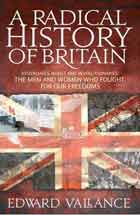The people's history
Tristram Hunt looks at the struggle for liberty in Britain
-

- The Guardian, Saturday 25 July 2009
As the cavalry of the Manchester and Cheshire Yeomanry sheathed their sabres and wiped down their sweating horses, St Peter's Fields echoed to the groans of the near 700 wounded and dying. "The sun looked down through a sultry and motionless air," recalled Samuel Bamford, "over the whole field, were strewed caps, bonnets, hats, shawls, and shoes, and other parts of male and female dress; trampled torn and bloody ... All was silent save those low sounds, and the occasional snorting and pawing of steeds."
- A Radical History of Britain
- by Edward Vallance
- Little, Brown,
- £23

Today, in Manchester, plans are afoot to commemorate the 1819 "Peterloo massacre" of reformers and democrats with a sculpture outside the GMEX Conference Centre (to replace the existing demure blue plaque). At the Church of St Mary the Virgin in Putney, thanks to the Guardian's 2006 competition to celebrate Britain's radical heritage, a new interpretation centre now explains the significance of the 1647 Putney debates. In King's Cross, the British Library has recently hosted an exhibition by Linda Colley on the history of liberty, while Lewes in East Sussex is this year almost entirely given over to championing the life of Thomas Paine. Something is in the air when it comes to Britain's radical past, and now we have Edward Vallance's interesting primer to help guide us through.
Vallance's admirable ambition is to abandon the left's traditional predilection for narratives of glorious failure. Instead, he wants to explore how progressive movements have succeeded and does so both by examining British radicalism in its specific historical contexts and by "evaluating the enduring power of the idea of a 'radical tradition'", reinvented for each succeeding age. From the outset he is rightly alive to the tensions between English and British strands of radicalism. Nowhere more so than in the Magna Carta, "the greatest constitutional document of all times - the foundation of the freedom of the individual against the arbitrary authority of the despot," in Lord Denning's words (a man well versed in the power of arbitrary authority). But as Vallance points out, this historic charter so beloved of Tony Benn was "a document forged as England stood on the brink of civil war; after a mere ten weeks, it was a political dead letter". What is more, the document which defenders of English (and then British) liberties cited from the 13th century onwards as defending legal due process and equality before the law was the 1225 version sealed by Henry III, not by wicked King John on the fields of Runnymede in 1215. And even that charter, as the passage of the Counter-Terrorism Act has most recently revealed, has never proved very effective at countering the will of princes or parliaments.
Indeed, it was King Charles I's arbitrary abrogation of power in the 1630s which first saw a sustained revival in Magna Carta studies led by the jurist Sir Edward Coke. And Vallance - as a historian of the 1688 glorious revolution - is at his sharpest in the 17th century. These chapters, following a quick canter through the peasants' revolt and Kett's rebellion, constitute the intellectual hub of the book as Vallance picks through the political thought of Britain's most philosophically fertile era. With a confident, scholarly touch, he reaffirms the significance of Leveller radicalism in the English revolution and the centripetal role of the Putney debates. In the Leveller pamphlet "Agreement of the People", he suggests, "the notion of inalienable, natural rights was, for the first time, being publicly recognised". And whether it is Lilburne, Overton or even Gerard Winstanley and the Diggers, Vallance impressively explores the vital interstices between their political and religious radicalism.
On into the 18th century and Vallance is equally interesting on the radical genesis of Paine and the political legacy of Mary Wollstonecraft. One of the great strengths of this book is a consistent and insightful treatment of female radicalism both in terms of women's involvement in radical politics and the broader battle for gender equality, concluding with suffrage.
But by the time we reach the Chartists and the 19th century, Vallance's footing is less sure. There are no clangers and the set pieces - the Tolpuddle martyrs, the Newport rising, the 1848 rally on Kennington Common - are done well enough, but with an almost total reliance upon secondary sources the book begins to take the tone of a well-trod chronicle. In contrast to his confident investigation of 17th-century political thought, no such light is shed upon Owenite, Chartist or Labour radicalism - or, indeed, counternarratives of liberal and Tory radicalism. Instead, we have a steady procession of names and events which then seeps into the 1900s with a highly perfunctory chapter covering the entire century - the Attlee administration being dispatched in a few crisp sentences. The exception to this is a highly sympathetic, even panegyric, investigation of the Pankhurst clan and their place in the struggle for the vote.
Perhaps most startling though is the parochialism of the study. Even amid the civil war (which formed part of a pan-European phenomenon), British radicalism often displayed a markedly internationalist sensibility. There is no mention of the abolitionist campaign or the anti-apartheid movement, nor British influence in the formation of the Pan-African Conference, the Indian National Congress and the broader anti-colonial agenda.
More debilitating is the tell-tale sign of academic infection. In contrast to the great radical accounts of British history by Christopher Hill and EP Thompson, there is an off-putting tendency here to luxuriate in self-conscious discussions of historiography and genealogies at the expense of the history itself. Vallance's laudable ambition was for this chronicle of "the men and women who fought for our freedoms" to inspire us to rise like Shelley's "lions after slumber" and continue the struggle. But the prose rarely matches the urgency of the subject matter, and rather than taking to the streets, one wants to retreat to the seminar room.
• Tristram Hunt's biography of Friedrich Engels is published by Penguin.
- guardian.co.uk © Guardian News and Media Limited 2009
No comments:
Post a Comment